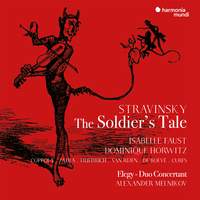Recording of the Week,
Stravinsky's L'histoire du soldat from Isabelle Faust and Dominique Horwitz
Last week I came across an interesting video discussion in which two Franciscan friars took a light-hearted look at “the Devil in popular culture” – dissecting cinematic treatments of that well-known red figure with horns, tail, pitchfork and, often, a violin. It turned out to be rather prescient, as today’s Recording of the Week features the very same infernal violinist, pitted against a downtrodden soldier in Stravinsky’s Faustian parable L’histoire du soldat. The crimson artwork certainly plays into the stereotype – sporting a horned, tailed, smirking demon fiddler.
 It will come as no surprise to readers that the (human, but very appropriately-named) violinist Isabelle Faust is eminently capable of adopting the biting, acerbic tone that the artwork suggests, and that the work indeed demands; but what did strike me as surprising was the use of the same narrator for all three versions. Three versions – for this is not one recording, but a trio; the French original by Charles Ferdinand Ramuz, an English translation, and a German one. Few narrators would be equally at home in this trilingual setting, but the French actor Dominique Horwitz (born in 1957 to German Jewish refugees who had fled Nazi Germany for Paris, and later educated in a French-speaking school in Berlin) certainly is. His still-perceptible accent in the English version is no obstacle at all to his engaging recounting of the story.
It will come as no surprise to readers that the (human, but very appropriately-named) violinist Isabelle Faust is eminently capable of adopting the biting, acerbic tone that the artwork suggests, and that the work indeed demands; but what did strike me as surprising was the use of the same narrator for all three versions. Three versions – for this is not one recording, but a trio; the French original by Charles Ferdinand Ramuz, an English translation, and a German one. Few narrators would be equally at home in this trilingual setting, but the French actor Dominique Horwitz (born in 1957 to German Jewish refugees who had fled Nazi Germany for Paris, and later educated in a French-speaking school in Berlin) certainly is. His still-perceptible accent in the English version is no obstacle at all to his engaging recounting of the story.
Indeed this feat is consistently very impressive – though his dramatic voicing of the Devil may prove a distraction to some listeners, bearing as it does more than a passing similarity to Andy Serkis’s memorable portrayal of Gollum in the Lord of the Rings trilogy. At any rate, it can’t be denied that Horwitz’s Devil sounds unmistakeably eldritch and unnatural.
The translations are interesting in their own right; the English version is a collaborative effort from 1954 by Michael Flanders (yes, that Michael Flanders) and the South African playwright Kitty Black. It captures the deliberate banality of the original rhymes almost too well, at times reminiscent of the whimsical poetry of Dr Seuss – but then the whole point of the piece, both verbally and musically, is the intentional avoidance of profundity.
In this, and in many other respects, L’histoire – or perhaps I should say Die Geschichte vom Soldaten – is commonly seen as a forerunner to the Brechtian school of theatre, principally reflected musically by Kurt Weill. Listening to the version using the German text immediately makes this connection as clear as crystal, right from the opening announcement of the work’s title. It could almost be Weill – a long-lost precursor to Mahagonny, perhaps.
 So much for the narration; what of the music? The approach is thoughtful, and mindful of the historical context. Each member of the septet plays on an instrument dating from the period of the work’s composition (with the exception of Faust’s Stradivarius and Wies de Boevé’s double bass). This is particularly noticeable in the wind and percussion, where the soundworld is distinctively different from what modern instruments would create. All seven players audibly lean into the disjointed, parodical nature of Stravinsky’s music, though in rare moments of relaxation (such as the Pastorale in Scene 2) they seamlessly switch into a more lyrical mode.
So much for the narration; what of the music? The approach is thoughtful, and mindful of the historical context. Each member of the septet plays on an instrument dating from the period of the work’s composition (with the exception of Faust’s Stradivarius and Wies de Boevé’s double bass). This is particularly noticeable in the wind and percussion, where the soundworld is distinctively different from what modern instruments would create. All seven players audibly lean into the disjointed, parodical nature of Stravinsky’s music, though in rare moments of relaxation (such as the Pastorale in Scene 2) they seamlessly switch into a more lyrical mode.
Supplementing L’histoire are two works in which that lyricism is much more to the fore. The album opens with the surprisingly haunting Élégie for unaccompanied violin, in which Faust’s tone, particularly in the muted opening, is spellbinding. I don’t know if it’s intended to be heard as some kind of prelude to, or comment on, L’histoire; but it certainly holds a sobering mirror up to the otherwise sardonic tale. The Duo concertant, in which Faust partners with her long-time pianistic collaborator Alexander Melnikov, is an absorbing and again unexpectedly lyrical work from the early 1930s in which it’s possible to hear hints of the neoclassical voice that Stravinsky was developing at the time.
L’histoire du soldat is nevertheless the main event, and this is as lively and characterful a performance as you’re ever likely to hear – as well as the most historically authentic that I’m aware of. Hallowe’en may still be a few months off, but making a pact with Faust and Horwitz could just prove devilishly rewarding…
Isabelle Faust (violin), Alexander Melnikov (piano)
Available Formats: CD, MP3, FLAC, Hi-Res FLAC
Isabelle Faust (violin), Alexander Melnikov (piano)
Available Formats: CD, MP3, FLAC, Hi-Res FLAC
Isabelle Faust (violin), Alexander Melnikov (piano)
Available Formats: CD, MP3, FLAC, Hi-Res FLAC





